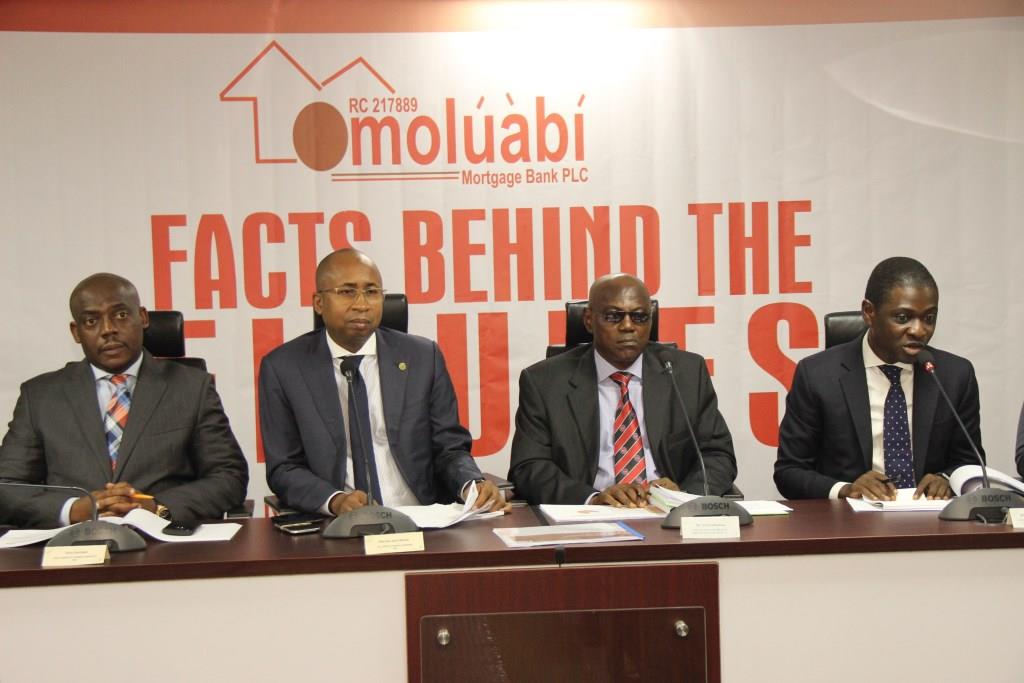Banking
Anxiety as Investor Pumps N438m into Omoluabi Mortgage Bank

By Modupe Gbadeyanka
Last week, on the floor of the Nigerian Stock Exchange (NSE), traders witnessed an unusual trading volume around shares of Omoluabi Mortgage Bank Plc.
What caught the attention of the investing community was that the volume of shares of the firm bought on that day, which was nearly 800 million units, comprising one-sixth of the total share outstanding of the mortgage bank.
Omoluabi Mortgage Bank, according to data obtained by Business Post from the stock exchange, has shares outstanding of 5 billion and last Tuesday, when this huge transaction occurred, the investor mopped up a total of 796,453,653 units of the company’s stocks from the market. The transaction was executed in a single deal.
Before then, the previous times shares of the lender were traded on the NSE were on October 25, 2019 when 120.5 million units were bought at 55 kobo; October 24, when 272 million units were purchased at 55 kobo; October 23, when 122.5 million units were acquired at 55 kobo each; October 22, when 174.3 million units were sold for 50 kobo per unit; and October 21, when 110 million units were traded at 55 kobo each.
But during last Tuesday’s transaction, the investor, whose identity could not be immediately ascertained as at the time of filing this report, bought shares of the company at 55 kobo each.
What is causing a part of the investing community to raise an eyebrow is if Omoluabi Mortgage Bank has attracted a new investor to turn fortune of the company around?
If this has happened, it means there might be a possible shake-up in the board composition of the company as the new buyer will likely want to have his interest represented on the board of directors to guard his investment.
From our analysis, the transaction last Tuesday cost not less than N438.1 million. The market capitalisation of Omoluabi Mortgage Bank as at the close of business last week stood at N2.750 billion.
Omoluabi Mortgage Bank is a company with a Below Listing Standard (BLS) status on the NSE because of a free float deficiency of 1.96 percent, according to the latest data from the NSE. However, the management of the company are already in talks with the stock exchange on how this issue would be resolved.
Banking
Banks Risk N150m Fine for Giving Hawkers New Naira Notes

By Modupe Gbadeyanka
Any bank caught supplying minted Naira notes to currency hawkers will have to pay a fine of N150 million, the Central Bank of Nigeria (CBN) has warned.
In a circular issued over the weekend by the acting Director of Currency Operations Department of the central bank, Solaja Olayemi, it was stated that it was becoming embarrassing that new banknotes are hawked at social events when most Nigerians are unable to get cash from Automated Teller Machines (ATMs) of banks or over-the-counter.
The banking system has witnessed shortage of cash for a while, with most ATMs not dispensing cash to customers despite efforts by the regulator to address the situation.
In the notice, the CBN said the distribution of freshly minted Naira notes illegally to currency hawkers will attract a penalty of N150 million per branch involved.
The apex bank disclosed that to curb the illegal practice, it has ramped up enforcement measures, including spot checks at banking halls, ATMs, and mystery shopping at locations linked to currency hawking.
“Any erring deposit money banks or financial institutions that is culpable of facilitating, aiding or abetting, by direct actions or inactions, illicit flow of mint banknotes to currency hawkers and unscrupulous economic agents that commodify Naira banknotes, shall be penalised at first instance N150 million only, per erring branch and at later instances apply the full weight of relevant provisions of BOFIA 2020,” a part of the circular stated.
The notice stressed the importance of banks strengthening their internal controls, particularly in cash management at branches and during teller operations.
Banking
CBN Insists Old, New Naira Notes Remain Valid Beyond December 31

By Aduragbemi Omiyale
The Central Bank of Nigeria (CBN) has reaffirmed that the old and new Naira notes will continue to be used for financial transactions in the country beyond December 31, 2024.
There had been rumours that the old and redesigned N200, N500, and N1,000 banknotes would no longer be legal tender from Wednesday, January 1, 2025, because the central bank would phase out the notes in compliance with a Supreme Court judgement of November 29, 2023.
But the apex bank, in a statement signed by its acting Director of Corporate Communications, Mrs Hakama Ali, on Friday, clarified that the apex court’s judgement being cited did not authorise the bank to phase out the banknotes by the end of this year.
According to her, the court allowed the CBN to leave the old and new notes to be used concurrently until it decides to gradually phase out the former.
The central bank’s spokesperson urged members of the public to disregard claims suggesting the old series of these denominations would cease to be valid at the end of this year.
She urged them to continue to accept all Naira notes for daily transactions, encouraging banks to also adopt alternative payment methods such as electronic channels to reduce the pressure on physical cash usage.
“The Central Bank of Nigeria (CBN) has observed the misinformation regarding the validity of the old N1000, N500, and N200 banknotes currently in circulation.
“In line with the bank’s previous clarifications and to offer further assurance, the CBN wishes to reiterate that the subsisting Supreme Court ruling granted on November 29, 2023, permits the concurrent circulation of all versions of the N1000, N500, and N200 denominations of the Naira indefinitely.
“For the avoidance of doubt, all versions of the naira, including the old and new designs of N1000, N500, and N200 denominations, as well as the commemorative and previous designs of the N100 denomination, remain valid and continue to be legal tender without any deadlines,” the statement noted.
Banking
Access Bank to Acquire 100% Equity in South Africa’s Bidvest

By Adedapo Adesanya
Access Bank Plc, the banking subsidiary of Access Holdings Plc, has entered into a binding agreement with South African-based Bidvest Group Limited for the acquisition of 100 per cent equity stake in Bidvest Bank Limited.
The deal for the 24-year-old South African lender is due to be completed in the second half of 2025, upon regulatory approval.
This shows Access Bank’s further expansion plans in line with goals set by its late founder, Mr Herbert Wigwe.
The agreement to acquire 100 percent stake in Bidvest Bank reflects Access Bank’s commitment to strengthening its footprint in South Africa and consolidating on its position as the continent’s gateway to global markets as it seeks to optimise the benefits of recent acquisitions and accelerate its transition towards a greater focus on efficiencies.
Bidvest Bank, founded in 2000 is a niche and profitable South African financial institution providing a diverse range of services, including corporate and business banking solutions and diverse retail banking products.
As of its year ended June 2024, Bidvest Bank reported total assets equivalent of $665million and audited profit before tax of $20million.
Upon conclusion of this acquisition, Bidvest Bank will be merged with the bank’s existing South African subsidiary to create an enlarged platform to anchor the regional growth strategy for the SADC region.
This is coming just as the bank opened a new branch in Malta as part of efforts to focus on international trade finance after obtaining a banking licence from the European Central Bank (ECB) and the Malta Financial Services Authority (MFSA).
Access Bank said the licence marks a transformative milestone in bolstering Europe-Africa trade flows.
The Maltese branch was established by Access Bank UK Limited, the subsidiary of Access Bank Plc, which is also the subsidiary of Access Holdings Plc, which is listed on the Nigerian Exchange (NGX) Limited.
-

 Feature/OPED5 years ago
Feature/OPED5 years agoDavos was Different this year
-
Travel/Tourism8 years ago
Lagos Seals Western Lodge Hotel In Ikorodu
-

 Showbiz2 years ago
Showbiz2 years agoEstranged Lover Releases Videos of Empress Njamah Bathing
-

 Banking6 years ago
Banking6 years agoSort Codes of GTBank Branches in Nigeria
-

 Economy2 years ago
Economy2 years agoSubsidy Removal: CNG at N130 Per Litre Cheaper Than Petrol—IPMAN
-

 Banking2 years ago
Banking2 years agoFirst Bank Announces Planned Downtime
-

 Sports2 years ago
Sports2 years agoHighest Paid Nigerian Footballer – How Much Do Nigerian Footballers Earn
-

 Technology4 years ago
Technology4 years agoHow To Link Your MTN, Airtel, Glo, 9mobile Lines to NIN















